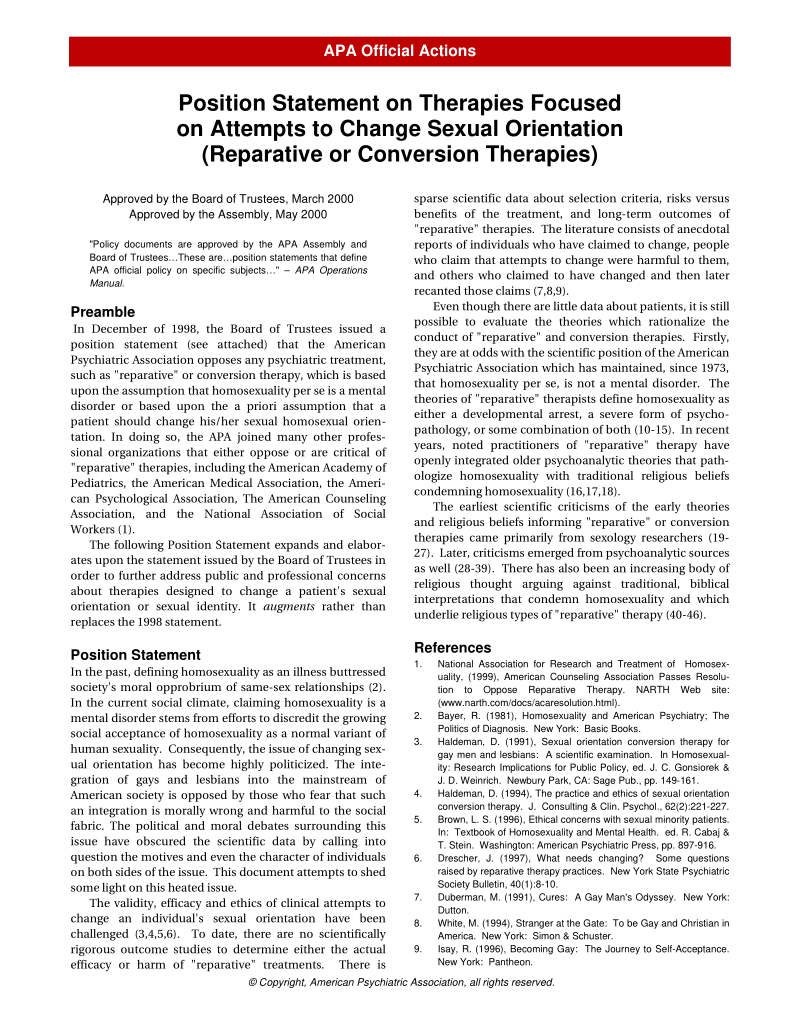American Psychiatric Association 2000 statement condemning "reparitive" therapy, stating it is questionable science and rejecting past research.
- Type
- Academic / Technical Report
- Source
- American Psychiatric Association Non-LDS
- Hearsay
- Direct
- Reference
American Psychiatric Association, "Position Statement on Therapies Focused on Attempts to Change Sexual Orientation (Reparative or Conversion Therapies)," May 2000
- Scribe/Publisher
- American Psychiatric Association
- People
- American Psychiatric Association
- Audience
- American Psychiatric Association
- Transcription
Position Statement on Therapies Focused on Attempts to Change Sexual Orientation (Reparative or Conversion Therapies)
Approved by the Board of Trustees, March 2000
Approved by the Assembly, May 2000
"Policy documents are approved by the APA Assembly and Board of Trustees...These are...position statements that define APA official policy on specific subjects..." – APA Operations Manual.
Preamble
In December of 1998, the Board of Trustees issued a position statement (see attached) that the American Psychiatric Association opposes any psychiatric treatment, such as "reparative" or conversion therapy, which is based upon the assumption that homosexuality per se is a mental disorder or based upon the a priori assumption that a patient should change his/her sexual homosexual orien- tation. In doing so, the APA joined many other profes- sional organizations that either oppose or are critical of "reparative" therapies, including the American Academy of Pediatrics, the American Medical Association, the Ameri- can Psychological Association, The American Counseling Association, and the National Association of Social Workers (1).
The following Position Statement expands and elabor- ates upon the statement issued by the Board of Trustees in order to further address public and professional concerns about therapies designed to change a patient's sexual orientation or sexual identity. It augments rather than replaces the 1998 statement.
Position Statement
In the past, defining homosexuality as an illness buttressed society's moral opprobrium of same-sex relationships (2). In the current social climate, claiming homosexuality is a mental disorder stems from efforts to discredit the growing social acceptance of homosexuality as a normal variant of human sexuality. Consequently, the issue of changing sex- ual orientation has become highly politicized. The inte- gration of gays and lesbians into the mainstream of American society is opposed by those who fear that such an integration is morally wrong and harmful to the social fabric. The political and moral debates surrounding this issue have obscured the scientific data by calling into question the motives and even the character of individuals on both sides of the issue. This document attempts to shed some light on this heated issue.
The validity, efficacy and ethics of clinical attempts to change an individual's sexual orientation have been challenged (3,4,5,6). To date, there are no scientifically rigorous outcome studies to determine either the actual efficacy or harm of "reparative" treatments. There is
sparse scientific data about selection criteria, risks versus benefits of the treatment, and long-term outcomes of "reparative" therapies. The literature consists of anecdotal reports of individuals who have claimed to change, people who claim that attempts to change were harmful to them, and others who claimed to have changed and then later recanted those claims (7,8,9).
Even though there are little data about patients, it is still possible to evaluate the theories which rationalize the conduct of "reparative" and conversion therapies. Firstly, they are at odds with the scientific position of the American Psychiatric Association which has maintained, since 1973, that homosexuality per se, is not a mental disorder. The theories of "reparative" therapists define homosexuality as either a developmental arrest, a severe form of psycho- pathology, or some combination of both (10-15). In recent years, noted practitioners of "reparative" therapy have openly integrated older psychoanalytic theories that path- ologize homosexuality with traditional religious beliefs condemning homosexuality (16,17,18).
The earliest scientific criticisms of the early theories and religious beliefs informing "reparative" or conversion therapies came primarily from sexology researchers (19- 27). Later, criticisms emerged from psychoanalytic sources as well (28-39). There has also been an increasing body of religious thought arguing against traditional, biblical interpretations that condemn homosexuality and which underlie religious types of "reparative" therapy (40-46).
. . .
Position Statement on Therapies Focused on Attempts to Change Sexual Orientation (Reparative or Conversion Therapies): SUPPLEMENT
Recommendations:
1. APA affirms its 1973 position that homosexuality per se is not a diagnosable mental disorder. Recent public- cized efforts to repathologize homosexuality by claim- ing that it can be cured are often guided not by rigorous scientific or psychiatric research, but sometimes by religious and political forces opposed to full civil rights for gay men and lesbians. APA recommends that the APA respond quickly and appropriately as a scientific organization when claims that homosexuality is a curable illness are made by political or religious groups.
2. As a general principle, a therapist should not determine the goal of treatment either coercively or through subtle influence. Psychotherapeutic modalities to convert or "repair" homosexuality are based on developmental theories whose scientific validity is questionable. Furthermore, anecdotal reports of "cures" are counter- balanced by anecdotal claims of psychological harm.
In the last four decades, "reparative" therapists have not produced any rigorous scientific research to substantiate their claims of cure. Until there is such research available, APA recommends that ethical practitioners refrain from attempts to change individuals' sexual orientation, keeping in mind the medical dictum to First, do no harm.
3. The "reparative" therapy literature uses theories that make it difficult to formulate scientific selection criteria for their treatment modality. This literature not only ignores the impact of social stigma in motivating efforts to cure homosexuality, it is a literature that actively stigmatizes homosexuality as well. "Reparative" ther- apy literature also tends to overstate the treatment's accomplishments while neglecting any potential risks to patients. APA encourages and supports research in the NIMH and the academic research community to further determine "reparative" therapy's risks versus its benefits.
- Citations in Mormonr Qnas
The B. H. Roberts Foundation is not owned by, operated by, or affiliated with the Church of Jesus Christ of Latter-day Saints.

